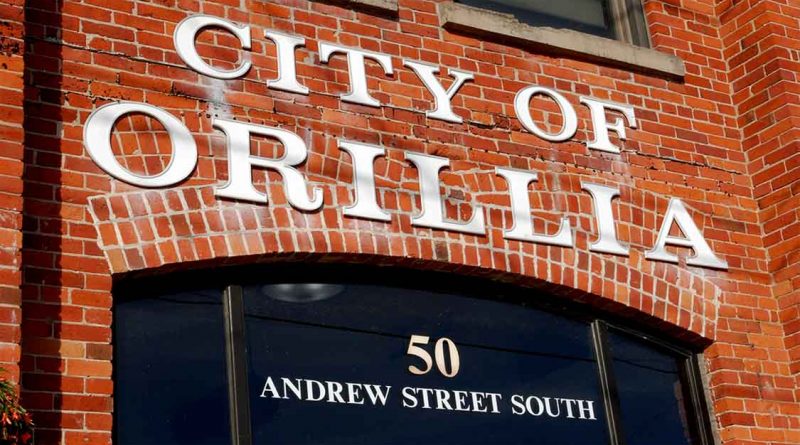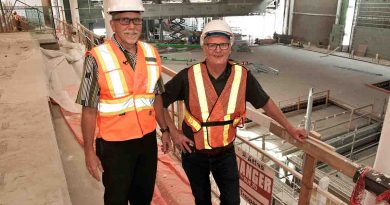Council Preview
By John Swartz
Orillia council has a series of meetings happening February 27 and 28. The normal committee/regular meeting starts at 2 p.m. Monday, but with the new meeting format the agenda also includes and starts with special meetings and council has one. In this case it’s a special public meeting regarding increases to permit fees.
The City charges fees, extra billing, for many types of services and building permits are a big chunk. Fees allowed under the Building Code Act. They did a review of the various fees to update (increase) them. One type of fees are those applied for enforcement (stop work, unsafe building, orders to comply) uncovered during inspections. The new fee for those is $375.
Staff uses the term offsetting costs, which implies the full cost of performing each (staff time, paper clips, copying, etc.) is not being charged. In fact, though staff do outline some of the costs involved on the City’s side, many times they do not cover all the costs or the term recovery would have been used.
In the case above, staff say if developers worked within codes and the permitting system those charges would be avoided.
Staff surveyed charges of other municipalities in Simcoe County. For example the range for building permits is from $100 to $250. Apparently the same service cost more (or less) in other places and why is not really a factor. Orillia currently charges $1`34 and staff recommend increasing it to the median of $150. Those who do math likely recognize the median of the range is actually $175.
Permit fees to construct decks are currently also $134. The range is $114 to $350. Staff recommend moving to the median of $185. Again the true median is $232.
That suggests fees are not based on actual cost, but rather some point achieving one of two goals, charging what the market will bear regardless of actual cost to perform the work, or find a level that encourages development in Orillia. It’s interesting to note the permit fee for building a simple deck compared to more extensive development is the same under the old fee structure. Even at the new rate, one would think the staff time involved in preparing permits is significantly less for a deck than it is for a house, apartment building or other construction. This reinforces the notion the fees are somewhat arbitrarily set inside some parameters.
Also in the report, in April staff are implementing an online permit process. This will significantly cut costs of using and managing paper, reduce the need to actually take time to go to City Hall, and allow for a 24 hours a day application submission period.
There are also 260 properties in the city with septic systems and they must be inspected every 5 years. The current fee is not given, but the range charged elsewhere is from $100 to $170 and staff are again proposing charging the median, $150 and in this case they are over the $135 actual median.
With the by-law changes proposed a new conditional building permit is introduced. This allows developers to start projects while final permits are being prepared. Here the fee proposed is $500 for a house and 10% of the building permit fee for all other types of construction. Staff say this will generate $10,000 of annual revenue.
Among the long list of new fee charges in the by-law is this curious one. There is a charge of $5 per page for digitizing paper documents. It would be useful and significantly cheaper to learn to use the scanner that almost all printers like the one you have next to the computer come with and do it yourself.
Moving On
When council adjourns the special meeting, the next item on the agenda is deputations and Wendy Timpano of the Community Development Corporation will be in to give council an overview of what the CDC does. This is the one agency in town that doesn’t come to council asking for money, so the point of this presentation is let new councillors know how the CDC fits into business development in Orillia.
One thing they do is help businesses get loans. They also provided $2.5 million of pandemic relief funding from the COVID-19 Relief and Recovery Fund, which is a federal program. The CDC also connects businesses to a range of other funding programs and resources, and also provides training and seminars on various topics.
Under the new meeting schedule, the flow gets interrupted by having the public forum next, followed closely by any closed session needs. There is one closed session item; to discuss integrity commissioner and closed meeting investigator appointments.
There is a report later in the meeting related to this. The recommendation is for council to appoint Principles Integrity (same as current) to a 4-year ending in April 2027.
When council resume in public anything relating to closed session items is first on the agenda for motions to be presented.
Reports
Council has three. First is an HR report to repeal the COVID-19 Prevention Policy. Previously council in closed session had an item published as – “COVID-19 Prevention Policy – Non Compliance.”
Along with this statement in the report – “Communications will be provided to staff to thank those employees who adhered to the policy and provided their proof of vaccination as per the City’s policy and the Provincial mandate,” it appears not all staff got vaccinations as required in order to keep working and the solution to dealing with flouting policy is to get rid of the policy.
Staff note repealing the policy does not mean it can’t re re-enacted should things turn south again.
Thanks Bill 23
Next is the first specific action the City has to take related to the province’s universally hated (unless you are a developer) Bill 23. There are two key changes, which when understood provides good reason why taxpayers and municipalities don’t like Bill 23. One is:
“Additional Notification to Property Owners to remove the requirement for Applicant’s to undertake a Consultation Strategy when preparing a Draft Plan of Subdivision or Vacant Land Condominium application, as a Notice of a Public Meeting for these development is no longer required by the Planning Act. As the new legislation no longer requires that a Notice of Public Meeting be provided prior to Council considering a proposal, then there is no need for Applicant’s to hold their own Consultation Strategy for Draft Plans of Subdivision and Vacant Land Condominiums.”
What that means is, if you think there has been uproar before over some development projects at the Official Plan and zoning amendment approval stage, just wait until people find out their neighbourhood is changing after council has met. All developers will be required to so is post a sign, and send the City a photo of it when they have submitted completed applications. Large–scale developments, (which are not defined in the report) still have to have public open houses and notify all property owners within 400 meters before completing Official Plan or zoning applications. The next is:
“Repeal and replace Site Plan Control By-law – Chapter 363 of the City of Orillia Municipal Code to remove fewer than 10 residential units from the definition of development, as recent changes to the Planning Act exempt such development from the Site Plan Approval process. The Site Plan Control By-law has also been updated to reflect that land lease communities are subject to Site Plan Approval and remove exterior design from Site Plan Control as required by the recent changes to the legislation.”
The key part of that is the reference to exterior design. Just think of the implications to neighborhoods when what a development looks like from the street, or your porch, is no longer a consideration.
Also, site plan approval covers a number of things. Among some of the necessary-for-being-good-neighbours developers have to get approval for is lot grading. Developments of fewer than 10 units no longer will have to do a site plan. Prepare for water runoff complaints to go through the roof. This change would also affect parking space requirements, at the very least where parking will be situated.
Consent Agenda
There are number of letters from various groups making grant requests. The Orillia Museum has their 4th Quarter report from last year listed. The City contributes $150,000 to OMAH’s operating budget each year.
Financially, OMAH has $2.8 million in various funds (think reserves, restricted and unrestricted) against $156,546 in liabilities. The museum had an operating surplus of $51,932 in 2022. But, combined with a capital budget deficit of $96,943, there was a total deficit of $41,768.
Hillcrest Lodge

There is also a letter from Hillcrest Lodge council will request a staff report on. It’s regarding a change in property tax exemption definition MPAC uses for the leased land the building is on. This would increase the property tax owing, of which there is under the old agreement and amount of $0. The change means the property tax is not zero any longer.
Because of this the non-profit corporation negotiated the sale of the land from the United Church Council to Hillcrest. However, the mortgage holder, First National Bank, is nervous about a potential back tax position of $100,000 and froze Hillcrest’s substantial escrow account, which is used for building repairs. This forced Hillcrest to fund repairs from their reserves. First National also ‘unilaterally’ raised Hillcrest’s mortgage payment to include a monthly property tax amount of $27,904.
This would result in Hillcrest having to raise the monthly charge to residents by $930. The facility was built for fixed income tenants. If something is not done soon, Hillcrest will have to file for bankruptcy in April, making 31 residents homeless.
The Hillcrest board is asking the City to reinstate a tax exemption from 2009 retroactively in order to finalize the property transfer, which would alleviate the back tax issue.
Next, is a report to be ratified from the previous committee meeting granting $129,250 to the housing development planned by Raising the Roof for the federal building on Peter Street, so they can buy the property. The amount includes building and engineering fees the City would charge another developer.
Council will also authorize $200,000 for the Downtown Tomorrow Grant program. They will also authorize a $500,000 3-year budget (from the 2022 budget) for the Innovation Hub project, which is now called the Innovation Collective (partnership with Lakehead and the CDC). The project also got a $150,000 Rural Economic Development grant. The purpose of the motion is to authorize releasing the previously budgeted funds and to create a steering committee.
A new fees schedule for all recreation facilities (including park uses) will be approved. Everything is going up significantly, shifting more of the cost of providing community facilities from the tax levy to individuals and groups on a per use basis. That means passes for the Orillia Recreation Centre and fees to leagues (at all indoor and outdoor facilities) are going up. Renting the main theater in Opera House will increase by approximately $100 to non-profits, $200 for residents and $400 for non-residents and commercial use (concerts), which will inevitably result in higher ticket prices to events. New fees apply in May. The old rate schedule is here, and will likely be updated soon.
Motions and By-Laws
There is one enquiry motion from councillors Jay Fallis and Jeff Czetwerzuk asking for a report on an updated study of traffic, pedestrian and turning counts on West Ridge Blvd. at Monarch Drive and at where it turns into University Avenue. They also want recommendations to improve turning conditions from Vanessa Drive and Stone Ridge Blvd. onto University.
Other than by-laws referencing matters above, a by-law to repeal Chapter 865 of the Municipal Code (relates to property standards) is on the agenda. Council previously enacted a new by-law, Chapter 866, in 2022, but left the old one on the books because there were 25 outstanding orders, which are now resolved.
Special Meeting – Budget Ratification
Following the above, council will meet to give final approval to the 2023 budget. The operating budget increases by $2 million to $67,155,570 over 2022. That is how much it will cost to run all municipal services.
February 28 Special Council Meeting – Economic Development
Council will meet at 1 p.m. The agenda has only two reports on it, one from June 2015 and one from October 2015. Both outline proposed (at the time) changes to how economic development is approached in Orillia. The reports are so old, it is likely they are being used as a guide for the new council to understand how the department operates now and consider changes not previously acted on. Another likely outcome is to order a report about new developments and directions to take.
Council meetings are open to attend, and Monday’s meeting can be watched live on Youtube. Tuesday’s meeting is also available on Youtube.
(Photos by Swartz – SUNonline/Orillia)




